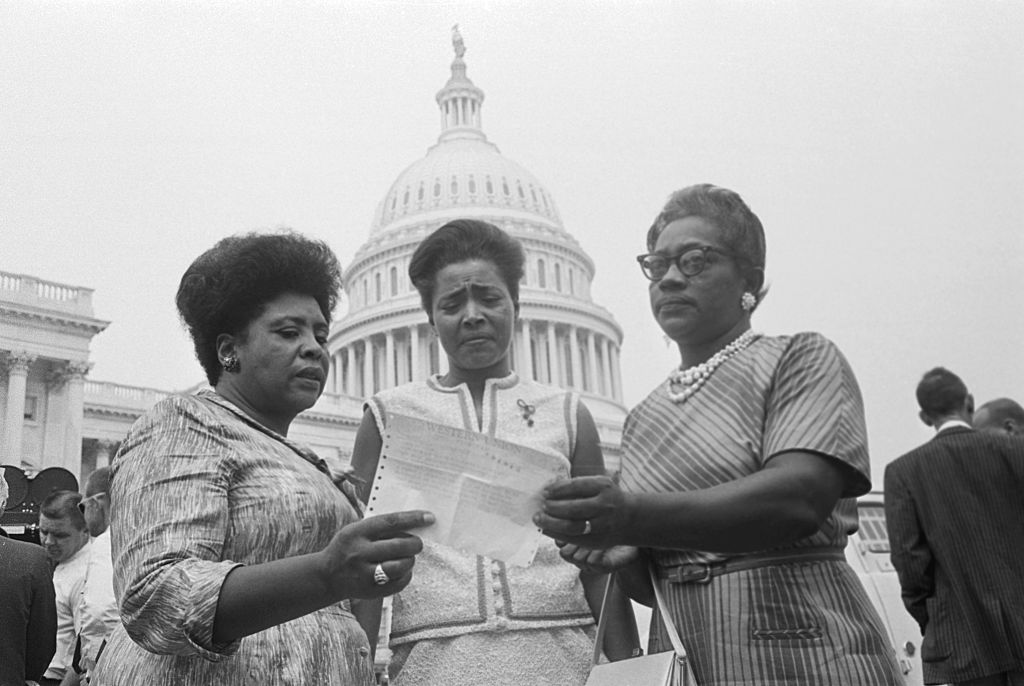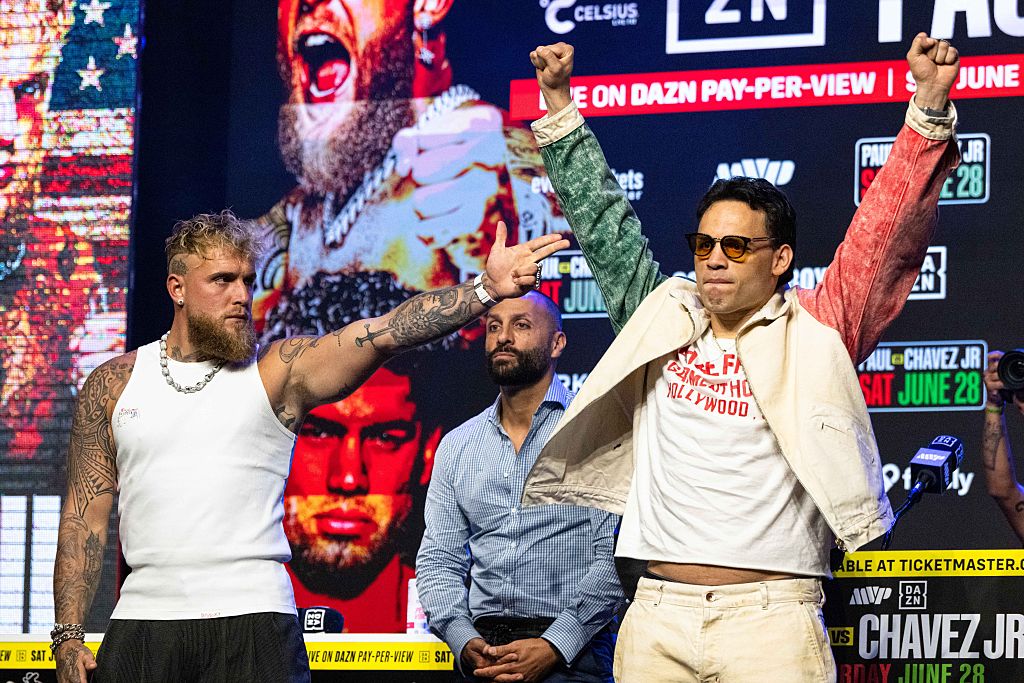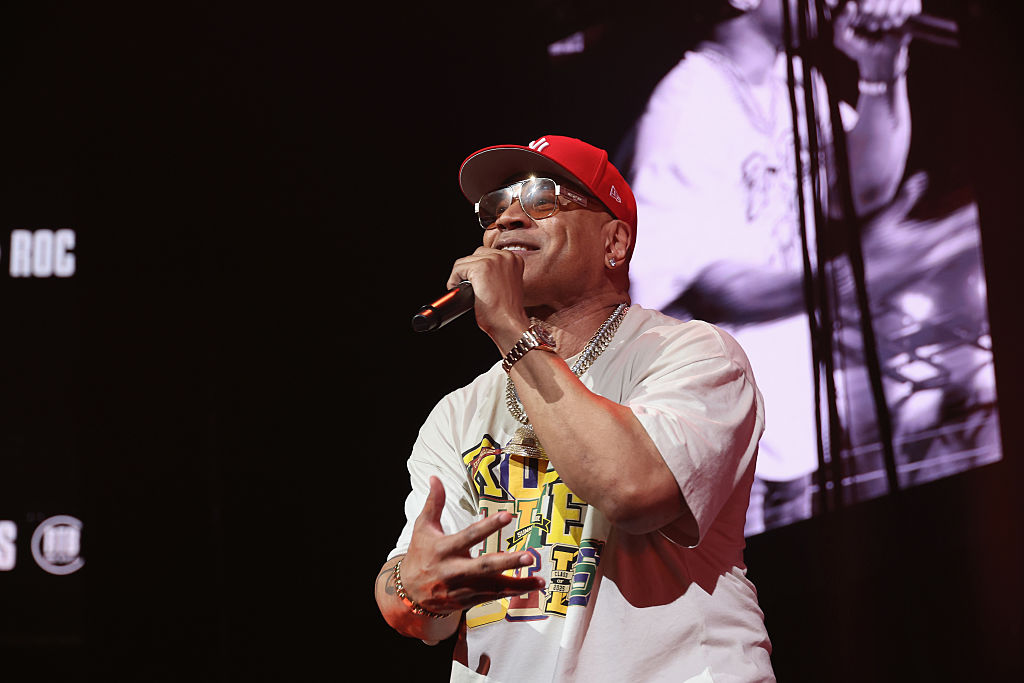
The House of Representatives met on Aug. 17, 1965, to affirm the seating of its Mississippi members, as Civil Rights demonstrators massed in silent support of their claim that the State’s elections were illegal because blacks were barred from the polls. Three members of the Mississippi Freedom Democratic Party’s contestants for the state’s five seats hold a telegram from Speaker John McCormick granting them permission to take seats on the House floor during the debate. They are, left to right: Fannie Lou Hamer, Victoria Gray, and Annie Devine. | Source: Bettmann / Getty
Friday marks the 103rd anniversary of the ratification of the 19th Amendment to the U.S. Constitution on Aug. 18, 1920.
We are reminded of a pivotal moment in history that transformed the landscape of American democracy. This amendment, often referred to as the Women’s Suffrage Amendment, marked a significant milestone in the fight for gender equality and political rights empowerment.
The ratification of the 19th Amendment in 1920 was the product of decades of relentless advocacy and determination by suffragists. Their efforts challenged societal norms and deep beliefs that women were not entitled to participate in the democratic process. The amendment represented the recognition that gender should never be a barrier to one’s fundamental right to cast a vote, ultimately, almost having everyone have a voice in the nation’s governance.
Beyond the Amendment
However, it’s important to acknowledge that the victory of the 19th Amendment was not equally experienced by all women. While it legally granted the right to vote for many. Systemic racism and discriminatory practices continued to disenfranchise Black women and women of color. Placing significant obstacles in their path to exercising this right. Their struggle for suffrage was not just a battle against gender inequality. But, also against deeply rooted racial prejudices that tainted society.
The anniversary of the 19th Amendment’s ratification offers us an opportunity to honor the significant contributions of Black women who played a vital role in the suffrage movement and beyond. These remarkable Black women recognized that the struggle for equality goes way behind gender lines. They knew that achieving justice required challenging racism, sexism, and other forms of oppression.
Black suffragists, such as Mary Church Terrell, Ida B. Wells-Barnett, and Nannie Helen Burroughs, lent their voices and actions to the fight for voting rights. Their tireless efforts and advocacy emphasized the urgency of dismantling discriminatory barriers that hindered marginalized communities from fully participating in the democratic process. Nonetheless, they paved the way for future generations of Black women to continue the struggle for civil rights and equal representation.
As we commemorate the 103rd anniversary of the 19th Amendment, it is important that we recognize the amendment’s limitations. In addition, we must remember that the work towards a more inclusive democracy is ongoing. Today, we pay homage to the Black women who not only fought for suffrage but also tirelessly advocate/advocated for rights.
Keep reading to find a list of remarkable Black women who have made significant contributions to voting rights.
1. Fannie Lou Hamer
 Source:Getty
Source:Getty
Fannie Lou Hamer was a courageous civil rights activist who played a pivotal role in the fight for voting rights. Born in Mississippi, she faced violence and intimidation as she worked to secure Black citizens’ access to the ballot box. Hamer’s powerful testimony at the 1964 Democratic National Convention shed light on the discriminatory practices that Black people faced, and her efforts helped pave the way for greater political representation.
2. Frances Ellen Watkins Harper
 Source:Getty
Source:Getty
Frances Ellen Watkins Harper was a trailblazing poet, writer, and abolitionist. Through her writings and speeches, she advocated for both women’s rights and the abolition of slavery.
3. Ida B. Wells
 Source:Getty
Source:Getty
Ida B. Wells was a pioneering investigative journalist and suffragist. She fearlessly exposed the horrors of lynching and racial violence through her writing. Wells was unyielding in her pursuit of justice and equality, advocating for both civil rights and women’s rights, and she was one of the founders of the National Association for the Advancement of Colored People (NAACP).
4. LaTosha Brown
 Source:LaTosha Brown
Source:LaTosha Brown
LaTosha Brown is a contemporary voting rights advocate and co-founder of Black Voters Matter. Her organization focuses on mobilizing marginalized communities, particularly in the South, to engage in the political process. Brown’s efforts emphasize the importance of grassroots activism and community empowerment to combat voter suppression.
5. Mary Church Terrell
 Source:Getty
Source:Getty
Mary Church Terrell was an educator, suffragist, and civil rights activist. As a co-founder of the National Association of Colored Women (NACW), she championed women’s suffrage while also advocating for racial and social equality. Terrell’s work highlighted the interconnectedness of various social justice causes.
6. Nannie Helen Burroughs
 Source:Getty
Source:Getty
Nannie Helen Burroughs was an educator and activist who founded the National Training School for Women and Girls. She believed in the significance of education for empowerment and worked to uplift Black women and promote political engagement. Burroughs’ advocacy extended to women’s suffrage and equal rights.
7. Nsé Ufot
 Source:Getty
Source:Getty
Nsé Ufot is a modern-day voting rights activist and CEO of the New Georgia Project. Her organization focuses on registering and engaging young people and people of color in the political process. Ufot’s work exemplifies the ongoing efforts to dismantle voter suppression and ensure a more inclusive democracy.
8. Rosa Parks
 Source:Getty
Source:Getty
Rosa Parks‘ pivotal role in the Civil Rights Movement is widely known, but her activism also extended to voting rights. Her refusal to give up her seat on a Montgomery bus sparked a major boycott, leading to broader social change.
9. Shirley Chisholm
 Source:Getty
Source:Getty
Shirley Chisholm made history as the first African American woman elected to Congress and later as the first African American woman to run for a major party’s presidential nomination. Her advocacy for both gender and racial equality left an indelible mark on American politics, inspiring future generations to engage in civic participation.
10. Stacey Abram
 Source:Stacey Abrams
Source:Stacey Abrams
Stacey Abrams is a contemporary leader known for her work against voter suppression. As the founder of Fair Fight Action, she focuses on ensuring fair elections and expanding access to voting. Abrams’ efforts to mobilize voters and increase voter engagement have been instrumental in advocating for a more equitable democratic process.


























